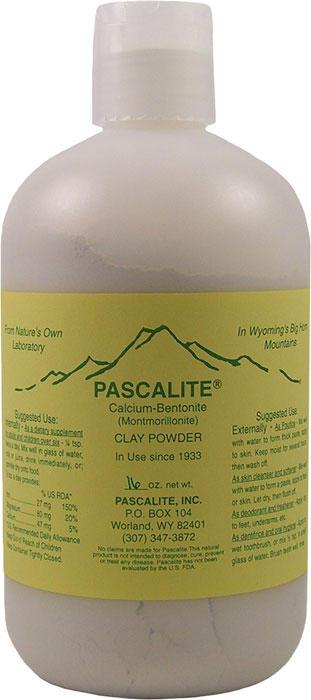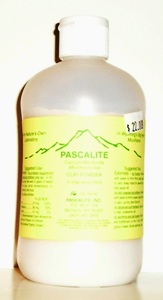It is a clay – Pascalite Bentonite Clay – that has been used for centuries as a remedy for many health problems. Its fine powder is formed when volcanic ash ages. It’s named after Fort Benton, WY, which has much of it. It’s also known as Montmorillonite clay after a region in France with a large deposit. You’ll also hear it called calcium bentonite clay or Pascalite Bentonite Clay.
Thousands of years ago, bentonite clay was eaten or applied to the skin. It was used for:
- Skincare or skin protection
- Acne or skin infections can be treated
- Gastric reflux treatment
- Diarrhea relief
Today, bentonite is used in medicine and makeup. It’s available in powders and pills, too. It’s used in:
- Shampoos
- Lotions
- Masks for the face
- Paste for brushing teeth
- Supplements for human diets
Bentonite Clay: How Does It Work?
As a face mask and pet litter clumper, bentonite clay adsorbs particles, like dirt on your skin. It also absorbs water, which is why it is used in face masks.
Clay, which has a negative charge, has a high cation exchange capacity, meaning it will attract positively charged ions, such as magnesium, sodium, and potassium. It also contains aluminum and silica. The body has a negative charge, also.
Your gut may also be attracted to positively charged toxins.
Health Benefits of Bentonite Clay
Antibacterial and anti-inflammatory properties are found in Pascolite and bentonite clay.
This healing clay has trace minerals such as calcium, iron, copper, and zinc. Some people eat it for these nutrients. That’s called geophagy. But the food people typically eat should contain these nutrients, but from overfarming the land, we can no longer find the necessary minerals in food!
It has been shown that bentonite clay may lower certain toxins in the body, such as aflatoxins, which are made by certain molds and can damage your liver. But more human studies are needed. It may also remove pesticides and treat metal poisoning.
The kidneys and liver already clean out your body. Fruits and vegetables also help.
Pascalite Bentonite Clay Uses
It’s used in many ways, but some are more promising than others.
Pascalite Bentonite Clay absorbs dirt and oil, such as sebum, which can lead to acne. It has antibacterial and anti-inflammatory properties that may help moisturize your skin.
There is evidence that bentonite clay may help with:
- Poison oak and poison ivy allergies
- Dermatitis of the hands
- Rash from diapers
- Ulcers or infections of the skin
- Protection from the sun with sunscreen
Mandatory warning: You should consult your doctor before using this clay if you have acne or dermatitis (eczema).
It is unknown whether bentonite clay can clean or soften human hair. Some people use it as a hair mask.
Several animal studies suggest that Pascalite Bentonite Clay boosts good intestinal bacteria. This may help with nutrient absorption. In humans, bentonite is sometimes used to treat diarrhea.
According to one study, bentonite can help constipation caused by irritable bowel syndrome. For several centuries, eating clay has been a common practice, all over the world. In the US, there are: are Pascolite clay, bentonite clay, and kaolin clay.
It is claimed by natural toothpaste makers that Pascalite Bentonite Clay is good for teeth and gums. Some say brushing with clay can “purify, detoxify, and alkalize” your mouth. However, there is no scientific evidence to support these claims.
Bentonite clay is also being studied for its beneficial effects on:
- The cancerous tumor
- Clotting of the blood
- Response of the immune system
- The health of the kidneys
Children’s exposure to aflatoxin (Aflatoxins are a family of toxins produced by certain fungi found on agricultural crops such as maize (corn), peanuts, cottonseed, and tree nuts.)
Risks associated with bentonite clay
There’s no FDA regulation for health and cosmetic products, so it’s impossible to tell precisely what’s in them or if they work. Bentonite clay is generally okay to use on your body, skin, and hair. If you want to try it, you should test a small amount on your skin first to make sure there will be no adverse reaction.
Medical doctors are not educated in Pascalite Bentonite Clay. They may think that it is dirt and it may cause a blockage in your intestines. Also, they may worry that soil or clay can contain harmful germs and heavy metals like lead, arsenic, and mercury. According to the FDA, at least two brands of bentonite clay supplements contain lead and should not be used.
You may not be getting enough minerals or have a mental illness if you eat clay. Pica is when people or animals crave to eat things that aren’t designated as food.
Disclaimer: Before taking oral bentonite or any supplement, talk to your doctor, especially if you’re pregnant or taking other medications.





